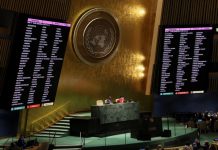The Indian government on Tuesday approved amendments in the country’s land laws for Jammu and Kashmir, allowing all Indian citizens to own property in the illegally occupied territory.
The Indian home ministry announced in a notification that the new law, Union Territory of Jammu and Kashmir Reorganisation (Adaptation of Central Laws) Third Order, 2020, is to come into effect immediately.
Under this law, any Indian citizen is able to buy land in the region. Earlier, only permanent residents of occupied Kashmir could have ownership of property in the region. The clause defining this has now been removed.
This development came on 27th October, which was observed as Black Day across Pakistan and Azad Kashmir to commemorate the start of India’s illegal occupation of Kashmir in 1947.
On 5th August 2019, India had repealed Article 370, nullifying occupied Kashmir’s special autonomous status. Article 35-A, a law barring non-residents from settling in occupied Kashmir and occupying government job, was also abrogated. The removal of these laws is seen as a move to shift the demographic of the Muslim-majority region and integrate it within a Hindu nation.
Earlier this year, India had also introduced new domicile laws, under which any person residing in Kashmir for a period of 15 years could the territory as their domicile. Any person who has studied for a period of seven years and appeared in class 10 or 12 examinations in an educational institution located in the territory would also be considered domiciled. The domicile law also covers the children of those central government officials, all India services officers, officials of PSUs, an autonomous body of the central government, officials of public sector banks, officials of statutory bodies, officials of central universities and recognised research institutes of the central government “who have served in Jammu and Kashmir for a total period of ten years or children of parents who fulfil any of the conditions in sections.”
The law passed on Tuesday sparked new fears among the Muslim population in India, numbering around 200 million, about their right and status within the Hindu-majority country.
Kashmiri leader Omar Abdullah, a former Chief Minister for Indian occupied Jammu and Kashmir, termed the new law “unacceptable.”
“[Jammu and Kashmir] is up for sale,” he said. “The poorer small land holding owner will suffer.”
The new development was also condemned by Pakistan.
Minister of States and Frontier Regions (Safron) Shehryar Afridi tweeted: “Another draconian law introduced by Indian regime on Black Day – reminding how occupant forces of India keeps on occupying all rights of Kashmiris. Now Indians & foreigners are also allowed to purchase land in Indian Illegally Occupied Jammu and Kashmir.”
Pakistan rejects illegal amendments: Ministry of Foreign Affairs
Later in the day, the Ministry of Foreign Affairs released a statement “categorically rejecting the illegal amendments in land ownership laws in IIOJK.”
The complete Press Release is as follows:
“Ministry of Foreign Affairs
(Office of the Spokesperson)
No. 460/2020
Press Release
Pakistan categorically rejects illegal amendments in land ownership laws in IIOJK
Pakistan categorically rejects the Indian government’s illegal amendments in land ownership laws in Indian Illegally Occupied Jammu and Kashmir (IIOJK) promulgated under “J-K Re-organisation (Adaptation of Central Laws) Third Order, 2020”. The highly condemnable Indian action is yet another clear violation of the UN Security Council resolutions, bilateral agreements between Pakistan and India, and international law.
The IIOJK is an internationally recognised dispute under the relevant UN Security Council (UNSC) Resolutions and international law. India’s illegal and unilateral actions of 5 August 2019, and subsequent measures, particularly the domicile law and now the land ownership laws, are aimed at changing the demographic structure of IIOJK to convert the Kashmiris into a minority in their own land. Changing the demographic structure of the occupied territory is a violation of the 4th Geneva Convention and constitutes war crime.
All these measures and laws, lacking legal and moral legitimacy, are forced upon the oppressed people of IIOJK through the barrel of the gun with an unprecedented military siege in the most militarized zone in the world.
It is reiterated that such steps can neither change the disputed nature of IIOJK, recognised as such by the United Nations and the international community, nor can they prejudice the inalienable right to self-determination of the Kashmiri people.
The United Nations and the international community must take immediate action to stop India from changing the demography and distinct identity of IIOJK and facilitate resolution of the Jammu and Kashmir dispute as per the relevant UNSC Resolutions and the wishes of the Kashmiri people.
Islamabad
28 October 2020″









